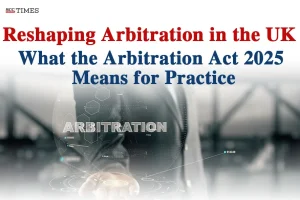The Arbitration Act 2025 marks a pivotal moment in the evolution of arbitration law in the United Kingdom. Enacted on 24-2-2025, the Act aims to refine and clarify existing principles, a reform that reshaped the UK’s arbitration framework.
The Act sets out a staggered commencement schedule for its provisions:
-
Immediate commencement: Sections 16 to 18 came into force on 24-2-2025.
-
Deferred commencement: Sections 1 to 15 take effect 1-8-20251.
Key Points on the Arbitration Act 2025:
-
The Act introduces a series of amendments2 to the Arbitration Act 1996, implementing several key changes to modernize UK arbitration law.
-
These changes refine core principles, clarify procedural powers, and align the UK’s arbitration regime with global best practices.
-
A new Section 6A is introduced, which clarifies the law applicable to arbitration agreements. It establishes that the governing law is either the law expressly agreed upon by the parties or, in the absence of such agreement, the law of the seat of arbitration.
-
It also clarifies that choosing a law for the main contract does not automatically apply to the arbitration clause. Exceptions are made for arbitration agreements derived from treaties or foreign legislation.
-
Section 23A imposes a duty on arbitrators and prospective arbitrators to disclose any circumstances that might reasonably give rise to doubts about their impartiality. This duty applies both before and during the arbitral proceedings and includes circumstances they ought reasonably to be aware of.
-
To protect arbitrators from undue exposure, Section 24(5A) introduces immunity from cost orders in removal proceedings unless bad faith is proven. This complements the general immunity under Section 29 and ensures arbitrators can act independently without fear of personal liability.
-
Section 25 is amended to clarify the consequences of an arbitrator’s resignation, allowing any party or the arbitrator to apply to the court for decisions regarding fees and expenses. Liability for resignation arises only if, in all the circumstances, the resignation is found to be unreasonable.
-
Jurisdictional clarity is enhanced by Section 32(1A), which prevents courts from reconsidering jurisdictional questions already ruled on by the tribunal, reinforcing the tribunal’s authority in determining its own jurisdiction.
-
Section 61 is amended to allow tribunals to award costs even if they lack substantive jurisdiction, unless the parties agree otherwise. This discourages tactical challenges and ensures fairness in cost allocation.
-
Under the new Section 39A, Tribunals can issue summary awards if:
-
A party has no real prospect of success on a claim or defence.
-
Parties are given a chance to make representations.
-
-
The newly inserted Section 41A, formally recognizes the role of emergency arbitrators within arbitral proceedings. Where parties have agreed to procedural rules that provide for such appointments, emergency arbitrators are empowered to issue peremptory orders, which may be enforced by the court under Section 42 of the Act.
-
Section 44 is amended to clarify that the court’s powers may be exercised in relation to both parties and non-parties to the arbitration. A new sub-section (6A) is added to provide for appeals from court decisions under this section, subject to the requirement of leave from the court.
-
he Act also revises Section 67, which governs challenges to awards on jurisdictional grounds. Courts may:
-
Confirm, vary, remit, set aside, or declare awards of no effect.
-
Set-aside only if remittal is inappropriate.
-
-
New subsections (3B to 3D) are introduced under Section 67 to refine the procedure for challenging arbitral awards on jurisdictional grounds. These provisions aim to limit re-litigation and enhance procedural efficiency:
-
New grounds or evidence are barred unless the party demonstrates that they could not have been discovered or presented with reasonable diligence during the arbitration.
-
Evidence already considered by the tribunal will not be re-heard by the court.
-
Court rules may govern admissibility to streamline proceedings and prevent duplication.
-
-
Section 70 is amended to redefine the starting point for challenge periods based on the outcome of appeals, corrections, or refusals to correct. The concept of “material” corrections is introduced, and references to party agreements under Section 57 are included.
-
Amendments are made to Section 18(1)(g) of the Senior Courts Act 1981 and Section 35(2)(fa) of the Judicature (Northern Ireland) Act 1978 to restrict appeals from High Court decisions under the Arbitration Act 1996 to those expressly permitted by the Act. Consequential amendments in Schedule 3 to the 1996 Act are repealed.
-
Minor amendments are made to Sections 32 and 45 simplify the conditions under which courts may determine preliminary points of jurisdiction or law. These changes remove outdated procedural hurdles and make court support more accessible.
-
Sections 85 to 88 of the Act, which related to domestic arbitration agreements and were never in force, are repealed, a clear shift toward a unified international arbitration regime.
-
Arbitration Act 2025 applies to:
-
England
-
Wales
-
Northern Ireland.
-
-
Amendments do not apply to:
-
Arbitral proceedings commenced before the effective date.
-
Court proceedings related to such arbitral proceedings or awards.
-
Any court proceedings started before the amendment’s commencement.
-
Arbitration agreements, regardless of when made.
-

